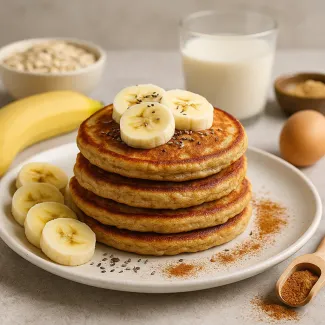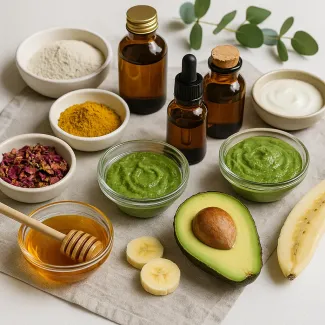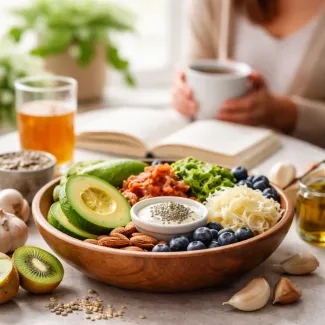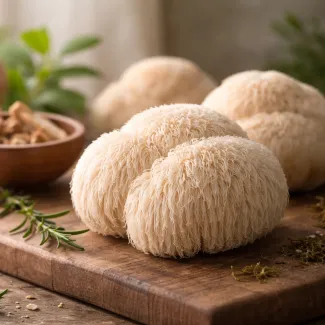
A Natural Approach to Supporting Gut Health After 30
Why Banana-Based Recipes Are an Ideal Start for Digestive Well-being
As we age beyond our 30s, many people begin to notice subtle changes in digestion. From feeling bloated after meals to experiencing slower metabolism or increased sensitivity to certain foods, these changes often signal that our gut health needs attention. While lifestyle factors like stress, lack of sleep, and poor diet play a role, our digestive enzymes and microbiota also naturally evolve with age. One of the most gentle, nutritious, and versatile foods to support digestion is the banana—especially when included in easy-to-make, gut-friendly recipes like the banana pancake featured in this article.
Whether you're looking to rebalance your microbiome, ease digestive discomfort, or simply begin your day with a light, nourishing meal, this banana pancake recipe can be a wholesome solution. And with the right combination of fiber, prebiotics, and easily digestible ingredients, it offers a soothing start to your day while helping your gut perform better.
The Digestive System After 30: What Really Changes
Reduced Enzyme Activity and Metabolism
After the age of 30, the body's natural enzyme production often begins to decline. This means the digestion of certain foods—especially proteins and fats—can become less efficient, leading to issues like bloating, gas, or heaviness after meals. Choosing recipes that use enzyme-rich and easily digestible ingredients becomes increasingly important.
Changes in Gut Microbiota Composition
The balance of beneficial gut bacteria can shift due to age, stress, medication, or a less varied diet. This can contribute to digestive discomfort, irregular bowel movements, and even immune system vulnerabilities. Supporting a diverse microbiome with fiber-rich, prebiotic foods like bananas and oats is essential.
Greater Sensitivity to Dairy, Gluten, or High-Fat Foods
Many people become more sensitive to certain food groups as they age. While intolerances may not be severe enough to diagnose medically, they can still lead to digestive upset. That’s why gluten-free, dairy-light, and low-fat breakfast options are increasingly popular among adults in their 30s and beyond.
Choosing the Right Ingredients for Gut-Friendly Recipes
Why Bananas Are a Smart Base
Bananas are a natural source of prebiotic fiber, especially inulin, which feeds the beneficial bacteria in your gut. They also provide potassium, which helps regulate fluid balance and muscle function—including the muscles of the digestive tract. Use ripe bananas for natural sweetness and easy digestion.
Oats: Gentle Fiber That Supports Regularity
Whole oats contain soluble fiber (mainly beta-glucan) that helps soften stool and regulate bowel movements. Unlike bran or raw fiber supplements, oats are gentler on the gut and are less likely to irritate sensitive stomachs. Use gluten-free rolled oats if gluten sensitivity is a concern.
Plant-Based Milk Alternatives
Using plant-based milk like almond, oat, or coconut milk ensures a lower fat and lactose-free profile that suits aging digestive systems. Many plant-based milks are now enriched with calcium, vitamin D, and B12, supporting bone health and energy metabolism.
Gut-Calming Spices: Cinnamon and Ginger
Adding spices such as cinnamon (which helps regulate blood sugar) and ginger (known for reducing bloating and nausea) can boost both flavor and function. These spices offer gentle digestive stimulation without adding heaviness.
Benefits of a Light Morning Meal for Digestive Health
Supporting Circadian Rhythms with Early Eating
Eating a balanced, light breakfast can help set your digestive and metabolic rhythm for the rest of the day. Skipping breakfast or eating too late may contribute to gut sluggishness, acid reflux, or overeating later in the day.
Gentle Start for Sensitive Stomachs
Heavier morning meals with meat, eggs, or fried foods can be too much for a sensitive digestive tract. Banana pancakes, on the other hand, are soft, warm, and hydrating, making them ideal as a first meal for those with morning nausea, IBS, or low appetite.
Recipe: Gut–Friendly Banana Pancakes
Ingredients for 2–3 Servings
- Banana (ripe) 2 large
- Rolled oats 100 g (1 cup)
- Plant-based milk 120 ml (½ cup)
- Eggs 2
- Baking powder 1 tsp
- Ground cinnamon 1 tsp
- Fresh grated ginger 1 tsp (optional)
- Pinch of salt
- Coconut oil (for pan) 1 tsp
Preparation Instructions
- In a blender, combine bananas, oats, plant milk, eggs, baking powder, cinnamon, ginger, and salt. Blend until smooth.
- Let the batter rest for 5 minutes to thicken naturally.
- Heat a non-stick pan over medium-low heat and add a small amount of coconut oil.
- Pour a scoop of batter and spread it into a small pancake shape.
- Cook for 2–3 minutes per side until golden brown and set.
- Serve warm, optionally topped with banana slices, a dollop of yogurt, or chia seeds.
How This Recipe Supports Digestion After 30
Low-Inflammatory and Gluten-Free
All ingredients in this recipe are naturally gluten-free, dairy-free, and low in processed sugars, helping reduce inflammation in the gut lining.
High in Soluble Fiber and Prebiotics
Bananas and oats are rich in soluble fiber, which helps bind water and create smooth bowel movements. Their prebiotic content supports beneficial gut flora that aid in long-term digestive balance.
Nourishing Without Overloading
This recipe offers a light but satisfying balance of carbs, protein, and fat. It gives sustained energy without the post-breakfast crash that many heavy or sugary meals cause.
Variations to Tailor the Pancakes for Your Gut
For Extra Fiber: Add Ground Flax or Chia Seeds
Both flax and chia offer soluble and insoluble fiber and gentle mucilage that lubricates the digestive tract. Add 1 tablespoon of either to the batter.
For Protein Boost: Add Plant Protein Powder
A scoop of plant-based protein (e.g., pea, rice) can make these pancakes more satiating for those needing higher protein intake in the morning.
For Lower Sugar: Use Green-Tip Bananas
If you're watching your blood sugar, use less ripe bananas (slightly green) which have lower glycemic impact and more resistant starch, beneficial for gut bacteria.
Common Digestive Symptoms After 30 and How to Manage Them with Diet
Bloating After Meals
Often caused by slow digestion or fermentable fibers. To reduce bloating:
- Avoid carbonated drinks
- Limit onion, garlic, beans
- Eat smaller portions more frequently
Irregular Bowel Movements
Lack of soluble fiber and hydration is often the cause. Include:
- Oats, bananas, chia seeds
- Warm lemon water in the morning
- Avoid excessive caffeine
Acid Reflux or Indigestion
A heavier late dinner or skipping meals can contribute. Improve symptoms by:
- Eating light meals earlier in the day
- Avoiding high-fat, spicy, or acidic foods
- Including calming ingredients like ginger and mint
Supporting Gut Health Beyond Breakfast
Stay Hydrated with Herbal Teas
Chamomile, fennel, and peppermint teas support gut motility and reduce intestinal spasms. Hydration also softens stools and reduces constipation.
Include Fermented Foods at Lunch or Dinner
Incorporating probiotic-rich foods like sauerkraut, kimchi, or yogurt in later meals supports a balanced gut flora, especially if breakfast is light.
Move Gently After Eating
A 10-minute walk post-breakfast encourages peristalsis (movement of food through the digestive tract) and reduces bloating.
Ideal Pairings for Your Banana Pancakes
Digestive-Friendly Toppings
- Plain coconut yogurt (unsweetened)
- Berries: high in antioxidants and low in sugar
- Ground flax or hemp seeds for healthy fats and gentle fiber
Beverages to Enhance Gut Comfort
- Warm ginger tea
- Lemon water with a touch of honey
- Unsweetened almond milk latte for dairy-sensitive drinkers
How Often Should You Eat These Pancakes?
They can be enjoyed 2–3 times per week as part of a balanced rotation of gut-friendly meals. Pair with variety to keep your microbiome diverse and digestion strong.
Additional Foods to Include in a Digestive Wellness Plan
Prebiotic-Rich Foods
- Asparagus, onions, leeks, apples, green bananas
Probiotic Foods
- Fermented vegetables, kombucha, kefir, live-culture yogurt
Anti-Inflammatory Staples
- Olive oil, turmeric, ginger, berries, leafy greens
Building Long-Term Gut Resilience After 30
As digestion becomes more sensitive with age, supporting your gut doesn’t mean restriction—it means choosing ingredients and meals that align with your body's evolving needs. Recipes like these banana pancakes can be an easy, enjoyable part of that journey, offering taste, nutrition, and balance all in one dish.





